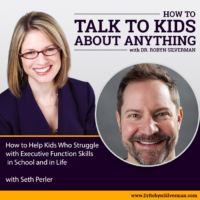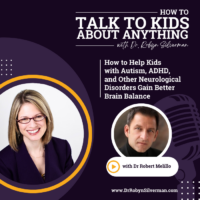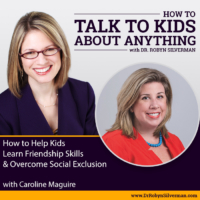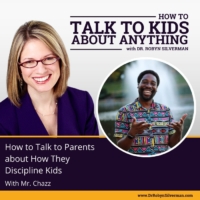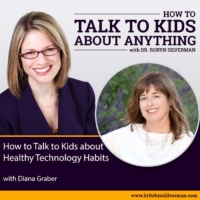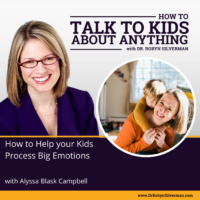Podcast: Play in new window | Download
Subscribe: Apple Podcasts | RSS | More
How to Help Parents Understand & Support their LGBTQ Kids
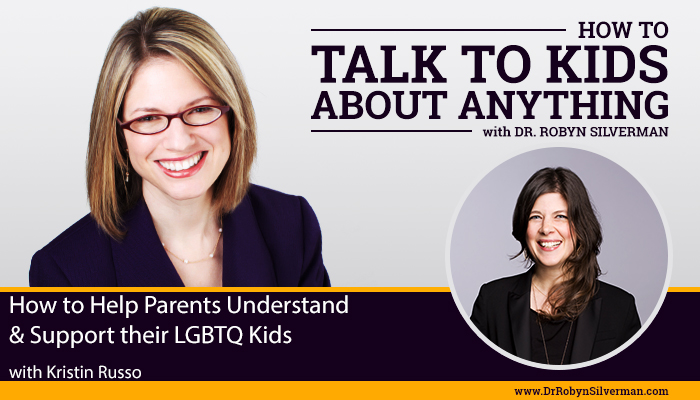
This podcast will focus on answering key questions for parents of LGBTQ kids that lead to greater understanding and support. However, please note that ALL parents should be listening to this podcast episode. As my guest says, during the interview; “If you are a parent of any child, learning about the LGBTQ community, learning how to make your home one that is loving and welcoming to people of all sexualities and all gender identities, making your conversations inclusive is so powerful because you never know how your child is identifying and you never know who is in your child’s life who might be going through things…This is a message, this is a podcast, this is a conversation for all parents- not just the one who think their child might be gay or who are gay.”
Guest Expert: Kristin Russo
When a child or teen comes out to their parents as gay, parents are often left with many unanswered questions  fueled by fear, lack of knowledge or concerns about the wellbeing of their child. The conversations that need to take place are not as much about you answering questions for your child but about your child answering questions for you. Your child has likely been navigating the coming-out process for quite some time, now, you will be faced with decisions about how you will react to the information. How will you share this information with others? How can you best support your child? What if you fear for their safety? What’s the deal with pronouns? You might also grapple with how your child’s sexuality fits in with your faith, your previous hopes and dreams for them and your relationship. Well, it doesn’t make sense to stick our heads in the sand. It’s time to learn the answers for everyday questions and concerns when you are a parent, aunt/uncle, teacher, grandparents of loved one of a kid who is gay. For guidance on this topic we have Kristin Russo on the show today.
fueled by fear, lack of knowledge or concerns about the wellbeing of their child. The conversations that need to take place are not as much about you answering questions for your child but about your child answering questions for you. Your child has likely been navigating the coming-out process for quite some time, now, you will be faced with decisions about how you will react to the information. How will you share this information with others? How can you best support your child? What if you fear for their safety? What’s the deal with pronouns? You might also grapple with how your child’s sexuality fits in with your faith, your previous hopes and dreams for them and your relationship. Well, it doesn’t make sense to stick our heads in the sand. It’s time to learn the answers for everyday questions and concerns when you are a parent, aunt/uncle, teacher, grandparents of loved one of a kid who is gay. For guidance on this topic we have Kristin Russo on the show today.
Kristin Russo is a writer, speaker, educator and consultant with a focus on Lesbian, Gay, Bisexual, Transgender, and Queer (LGBTQ) issues. She is also co-host & producer of Buffering the Vampire Slayer alongside musician Jenny Owen Youngs, which was named one of the top 30 podcasts of the decade by Paste Magazine. She has a great book with co-author Dan Owens called This is a Book for Parents of Gay Kids. You can find her at kristinnoeline.com
The podcast provides:
- The dos and don’ts when you suspect your child is gay or your child comes out to tell you s/he’s gay.
- What to do/say when you are worried about your child’s safety after they come out?
- How to understand the basics of gender identity
- How, when and who you should tell when your child comes out to you
- How to talk to your child about sex when you know s/he is gay
- How to cope when your faith community doesn’t embrace gay people
- How to understand and use pronouns when your child is gay
Important Messages:
- Usually not a good idea to ask your child if s/he is gay. Let your child share that information with you if and
 when your child feels ready. If your child has been dropping hints and you believe that s/he is trying to get you to ask, navigate that on your own.
when your child feels ready. If your child has been dropping hints and you believe that s/he is trying to get you to ask, navigate that on your own. - Sometimes parents pick up on things before a child is even aware themselves. Can make a child very self-conscious. Perhaps don’t know yet or not ready to discuss. Let your kid come to you.
- Create an environment in which your child can come to you- that is in the parent’s control.
- Be an “askable” parent: Watch shows with diverse characters, talk about equal rights, discuss people who are queer- give your children the hint that you are a parent who will love them no matter what.
- Not always a “coming up moment”. It’s a process. It’s ongoing. First step- make sure to communicate to your child that you love them and thankful to them for coming to you with this big part of them.
- Don’t say: “I knew it.” Or “Are you sure?” Just focus on the fact that your child is sharing a truth about themselves with you. “Thank you for sharing this with me. I’m so happy that you trusted me with this part of yourselves and I love you and I’ll always love you.” There will be other things that happen after this conversation—but if you can start there, it’s a very positive place to start.
- Parents who are scared for their child’s safety: There is a way to have a conversation about safety issues without making your child feel ashamed of who they are. Make sure your child knows that you will always stand by them or you will always defend them. It will depend on where you live—the safety factory. Safety depends on how you define it. Verbal? Physical? Mental? Emotionally?
- Ask: Do you think you’ll be safe? Do you feel safe?
- You can’t force your child to hide who they really are. Can’t say out of one side of your mouth “don’t be ashamed of who you are” and out of the other “but you need to hide it”. The negative side can dominate.
- Worried about school safety? You have pull. You have friends who can help and support and educate the school more about how to keep kids safe? Start those conversations.
- Ask: Are there other kids who are out at your school? Do you feel safe? What do you think will happen? Have the conversation. If you feel that they should tell a group of friends first, that’s something to discuss. You can get involved with the school admin- signaling to your child that you have their back. Signals to the school that there are parents who want to make the school safer for all kids- especially those that might be targeted or marginalized.
- If you don’t feel that your religious community is going to be accepting of your kid when they come out, find a different community. This may be really hard- but these communities do exist of every denomination. It’s not easy. Conflicting feelings. Parents need to know that they are going through a process too. Kids need to be embraced—but so do the parents.
- When a faith community doesn’t accept your kid, you also become closeted. You can’t be your full self. Your keeping a piece of yourself private and to the back.
- CAREFUL: Is it a choice? Phase? These questions are more about you than they are about your child. Turns out, it shouldn’t matter. This implies that you have to accept me because I couldn’t choose otherwise. Saying- my way of living it bad but you have to accept it because I didn’t choose it. Ask yourself; WHY DOES IT MATTER? You kid is telling you who they are today. Do you know who you are going to be for the rest of their lives? It shouldn’t matter
- Who should you tell? Others in the family? The school? The mailman? It depends on whether your child wants you to tell, what’s him/herself to tell, doesn’t want to tell yet, etc. Have the conversation about what they want to happen before you go ahead and tell people. Don’t make assumptions.
- This is a coming out for you too. This will connect you to your child. It’s hard to say these things. You don’t know how they’ll respond. You don’t know how your words will impact your relationship. But don’t be so hard on yourself if it feels like a big thing to lift- it is!
- Sex talks: Different dependent on the relationship you have with your child. Some know that their relationship works better when you have a written conversation (like an email). Remember- you can’t fit everything into one conversation!
- Sex Talks: People get overwhelmed because they think “I only know straight sex- I don’t know about ‘gay sex.’ But when you break it all down, sex is sex is sex is sex. There are fluids, fluids carry things inside them and we might exchange them during sexual relations with other people. There are many ways that can happen and being heterosexual does not mean you are only having one kind of sex. That can sometimes alleviate some kind of the fear. No matter who are kids are and what their sexuality is, we need to tell them how to keep their bodies safe or safer- that’s a great place to start. You’re not going to know everything. Find resources that you can share with your kids that are inclusive.
- Do you want to give them the information or do you want them to stumble on the information? You want to be the trusted source.
- Cory Silverberg: What makes a baby. Sex is a funny word. Books that are inclusive.
- Pronouns: Transgender seemed so clear-cut—but for other kids, this doesn’t encapsulate how they feel. They feel much more gender fluid. Gender means something different to them than many others. It’s ok to be confused. Just not, “no!” Might use “they/them” as they are nonbinary. Some feel that they are clear cut. “This is who I am, I’m using they/them, this is my name.” Others are still figuring it out and trying on the gender identities to figure out what feels right for them. Exploring what is right for them.
- E-care package- for parents of trans kids. By a team who identify as trans. Asks you to think about your relationship with gender. Some, for example, identify as women and get their hair and nails done while others identify as women and don’t want any of that. We all negotiate gender and the more we understand that, the more we can understand what our kids are experiencing.
- Think about how you would feel if you identify as she/her and someone kept referring to you as he/him. That’s the dissonance!
- It takes time. Desk with garbage can that’s been on the right, and is now on the left, you’re going to go throwing your garbage on the floor for the first few weeks! You are forming new pathways. You’ll start making corrections. And remember to use your child’s pronouns when that person is not there too.
- Most kids know you will make mistakes when shifting.

- If you are a parent of any child, learning about the LGBTQ community, learning how to make your home one that is loving and welcoming to people of all sexualities and all gender identities, making your conversations inclusive because you never know how your child is identifying and you never know who is in your child’s life who might be going through things. This is a message, this is a podcast, this is a conversation for all parents- not just the one who think their child might be gay.
Notable Quotables:
- “Usually it’s best to let your kid come to you.”
- “Be an ‘askable’ parent.”
- “Create an environment where your kids can feel comfortable coming to you. Talk about equal rights,
 watch television shows where there are gay and trans characters highlighted. These are some ways to give your children the hint that you are a parent who will love them no matter what, be open to them no matter what and be there for conversation and learning.”
watch television shows where there are gay and trans characters highlighted. These are some ways to give your children the hint that you are a parent who will love them no matter what, be open to them no matter what and be there for conversation and learning.” - “When your child comes out to you, don’t say ‘I knew it’ or ‘are you sure?’ Say; ‘Thank you for sharing this with me. I’m so happy that you trusted me with this part of yourself and I love you and I’ll always love you.’ There will be other things that happen after this conversation—but if you can start there, it’s a very positive place to start.”
- “You can’t ask your child to hide who they really are. It’s unsafe to feel like you can not be honest about who you are in any circumstances. It can be damaging.”
- “Having a safe home environment is massive. A lot of young people feel unsafe at school and unsafe at home with being out. Even if a child is struggling at school, if they feel like they have a safe place they can come to that is safe, that is huge in a kid’s journey through sexuality and gender identity.”
- “If you don’t feel that your religious community is going to be accepting of your kid when they come out, find a different community. They exist. There are religious communities of every denomination that exist explicitly to accept people of all sexualities and all gender identities. Letting your kid know that they can still have a relationship with their faith while being open about who they are. If your faith community is not going to accept your kid, get out.”
- “When a kid comes out as gay, the parent goes through a process too.”
- “Your kid needs to be in a faith community where they can be themselves- and this extends to the parent as well. If you are in a faith community- or any community- where they don’t accept your kid, you are also are closeted in a way. You are also not being your full self because you keeping a piece of the truth to the back.”
- “When you break it all down, sex is sex is sex is sex. There are fluids, fluids carry things inside them and we might exchange them during sexual relations with other people. There are many ways that can happen and being heterosexual does not mean you are only having one kind of sex. No matter who are kids are and what their sexuality is, we need to tell them how to keep their bodies safe. That’s a great place to start. You’re not going to know everything.”
- “No matter who your kid is; we all have bodies, they all have fluids, we need to explain various ways that they can keep themselves safe and you should have those conversations with your kid no matter who they are having sex with because it’s about safety and there’s not that much of a difference.”
- “They are exploring what it means to be in their body in a world that says that gender is one of two things but knowing, thankfully, that it is not one of two things. They are playing around with how they feel comfortable in their skin, how they’d like to be referred to, and as a parent if you get to be part of that journey, it’s an honor and a privilege that is so wonderfully exciting. It is really beautiful if you get to be part of that with your child.”
- “We all negotiate gender and the more we understand that, the more we can understand what our kids are experiencing.”
- “Using your kid’s name and pronouns is a very clear way of saying I recognize you, I believe you, I accept you, I love you.”
- “If you are a parent of any child, learning about the LGBTQ community, learning how to make your home one that is loving and welcoming to people of all sexualities and all gender identities, making your conversations inclusive is so powerful because you never know how your child is identifying and you never know who is in your child’s life who might be going through things…This is a message, this is a podcast, this is a conversation for all parents- not just the one who think their child might be gay or who are gay.”
If you are a parent of any child, learning about the LGBTQ community, learning how to make your home one that is loving and welcoming to people of all sexualities and gender identities is so powerful, says @kristinnoeline on #talktokids
Click To Tweet
Using your kid’s name and pronouns is a very clear way of saying I recognize you, I believe you, I accept you, I love you says @kristinnoeline on #talktokids podcast
Click To Tweet
Resources:
-
-
-
https://twitter.com/kristinnoeline
-
https://www.facebook.com/kristinnoeline
-
-
This is a Book for Parents of Gay Kids (book)
-
Sex is a Funny Word (book)
-
What Makes a Baby (book)
The post How to Help Parents Understand & Support their LGBTQ Kids with Kristin Russo – ReRelease appeared first on drrobynsilverman.com.

